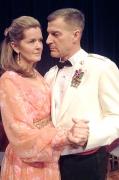SITE GUIDE
SEARCH
REVIEWS
FEATURES
NEWS
Etcetera and
Short Term Listings
LISTINGS
Broadway
Off-Broadway
NYC Restaurants
BOOKS and CDs
OTHER PLACES
Berkshires
London
California
New Jersey
DC
Philadelphia
Elsewhere
QUOTES
TKTS
PLAYWRIGHTS' ALBUMS
LETTERS TO EDITOR
FILM
LINKS
MISCELLANEOUS
Free Updates
Masthead
Writing for Us
A CurtainUp Los Angeles Review
Defiance
|
He wants your ass, my soul, and the keys to the car.—
Capt. King describing Chaplain White to Colonel Littlefield
|

Jordan Baker (Margaret Littlefield) dancing with her on-stage and off-stage husband Kevin Kilner (Lt. Col. Littlefield)
|
Chronologically, the plays progress from the beginnings of doubt of the system as we know it in the 1960s to the devastating questioning of the whole structure brought about by the Vietnam War in the 1970s. The playwright expands his point of view from the simple issue that dominated his school days to the many issues that exploded during his military tour in the 1970s.
Lt. Col. Littlefield (Kevin Kilner), RA all the Way, storms into his new position as base commander of a military camp in North Carolina in 1971, determined to assuage the racism which scourges his personnel. He's accompanied by his loving wife Margaret (Jordan Baker), a college graduate who stands up for their son who has gone to Canada rather than go to war, an action the Colonel bitterly describes in the obscenely familiar phrase, "Cut and Run." This family conflict mirrors the broader conflict which the Colonel seeks to resolve by enlisting the help of African-American Captain King (Robert Manning, Jr.) who wants to serve just as a marine, not as a representative of his race and the new Chaplain White (Leo Marks), a narrow-minded Alabama Lutheran who is almost a figure of fun.
"Catholics are more fun. To them, religion is a blood sport,"sniffs the Colonel, abruptly sending the Chaplain on his way. Humiliated by the Colonel, White sees his chance for revenge when the Colonel, on a surreptitious scouting trip to an apartment complex known for discriminating against blacks, succumbs to temptation and has sex with the wife of an enlisted man on his base. White decides to kill two birds with one stone by dumping the EM's confession in the lap of the Colonel's new Executive Officer, the atheist, Captain King, "He wants your ass, my soul and the keys to the car," King tells Littlefield in the ultimate scene.
Shanley is always taking us in new directions. Scene 1 sets the characters up for an exploration of racial conflict and faith or its lack. Scene 2 seems almost superfluous, as the Chaplain and Captain King meet over bar bells in the camp gym. In a world where God is forgotten or denied, the Chaplain's steely smile and unremitting evangelism appear naive and irrelevant. Shanley lets us spend time with him through this undramatic encounter in the gym, setting us up for the surprising developments in the next act and a denouement dominated by the underestimated Chaplain. "He's hanging over this whole thing like bad weather," defines King. Like everything else that begins in this 1971 time slot, the characters' development can be seen in full flower today.
Shanley's sense of place is visible in sly snapshots of military life. The Colonel describes his belief and desire that military life is "a world apart." The chain of authority is subtly demonstrated when King rejects a cold drink from the chaplain but when the Colonel says, "Have some," replies, "Sure." Shanley writes women extremely well and, although Margaret's part is small, she's very much a sturdy woman of her time who, even though she describes herself as invisible, is never diminished. As a whole, this is the most full-figured cast of characters the playwright has written yet.
This cast realizes all the characters brilliantly. Kevin Kilner is a spit-and-polish Colonel, whose performance finds a fine balance between ambition and humanity, using his powerful low tones to vocally portray authority. Jordan Baker is warmly believable as Margaret, who matches his strength with her own. As Captain King, Robert Manning, Jr., projects a dignity and reserve that combine pragmatism with a determination to be his own man. The ever reliable Leo Marks is an implacable delight as Chaplain White, never crossing the line that would make him a caricature. The anguish in the small but crucial part of PFC Davis is fully embodied by Dennis Flanagan. Joel Polis is riveting as the battle-crazed veteran Gunney.
Austin Switser's video design is composed of newsreel projections across stage rear that flesh out the era. Peter Erskine's musical adaptations echo military themes with haunting delicacy and precision. Defiance examines our spiritual, ethical and military values at their 20th century roots in 1971. The flashes of perceptive humor make it bearable but only because they remind us how human we are.
For a review of the New York premiere go here
|
DEFIANCE Playwright: John Patrick Shanley Director: Andrew J. Robinson Cast: .Kevin Kilner (Lt. Col. Littlefield), Jordan Baker (Margaret Littlefield), Robert Manning, Jr. (Captain King), Leo Marks (Chaplain White), Dennis Flanagan (PFC Davis), Joel Polis (Gunney) Set Design: John Iacovelli Lighting Design: Paulie Jenkins Costume Design: Maggie Morgan Video Design: Austin Switser Music Composer/Adator: Peter Erskine Running Time: 90 minutes Running Dates: January 12-February 18, 2007 Where: The Pasadena Playhouse, 39 S. El Molino Ave., Pasadena, Reservations: (626) 356-PLAY Reviewed by Laura Hitchcock on January 19. |

Easy-on-the budget super gift for yourself and your musical loving friends. Tons of gorgeous pictures.

Leonard Maltin's 2007 Movie Guide

At This Theater

 >
>

